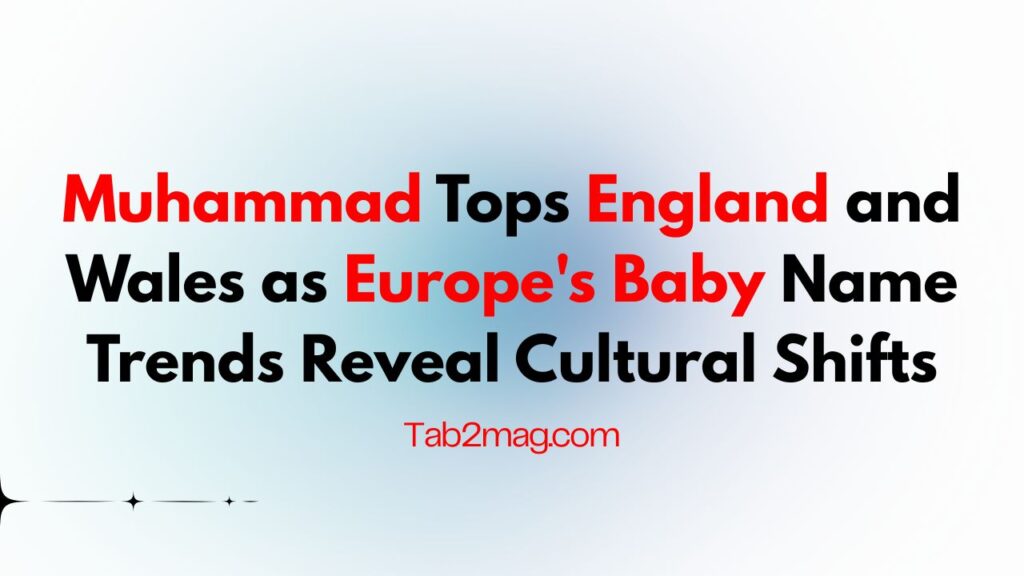Most Popular Name Claims Crown for Second Consecutive Year
The most popular baby names across Europe paint a fascinating picture of cultural diversity and shared influences, with Muhammad maintaining its position as the top choice for boys in England and Wales for the second year running.
Noah Dominates Continental Europe While Regional Preferences Emerge
Our comprehensive analysis of baby naming trends across 16 European nations reveals Noah as the standout favorite for boys, claiming the top spot in four countries. Meanwhile, Emma and Olivia share honors as the most popular girls’ names, each leading in two nations.
In Germany, Noah tops the charts for boys, while France favors Louise for girls. The data showcases both universal appeal and distinct regional preferences across the continent.
Expert Explains Noah’s Enduring Appeal
Clare Green, a linguistics expert who writes for baby-naming website Nameberry, attributes Noah’s widespread popularity to its perfect balance of vintage charm and contemporary freshness.
“Biblical names are universal,” Green explained. “Noah hasn’t been used for a long time, but I know that there were a couple of pop culture things that made it popular, like the movie The Notebook.”
The expert believes parents across Europe felt the timing was right for this classic name’s comeback, demonstrating how cultural moments can influence naming trends across borders.
Hollywood and Media Drive Cross-Border Name Trends
Pop culture continues to be a powerful force in baby naming decisions. Green points to the surge in girls named Emma approximately 20 years ago, coinciding with Jennifer Aniston’s character Rachel choosing the name in the hit sitcom Friends.
“Anything can be an inspiration for parents, but some of the biggest sources of name ideas come from Hollywood, music or royalty,” she noted.
Geographic Boundaries Still Matter for Complex Names
Despite globalization, some names remain culturally bound. Green explains that complicated-sounding Scandinavian names often stay within their borders due to pronunciation challenges, while names with simple sounds achieve broader international appeal.
Digital Age Creates New Naming Dynamics
The internet and modern media are reshaping how names spread globally. Green predicts that increased international travel and multicultural relationships will drive parents to choose names that work across different cultures.
“There are now lots of couples having children together from different countries, meaning they will often pick a name that might fit both of their cultures,” she observed, while acknowledging that some parents will always resist global trends.
Czech Republic Shows Remarkable Name Stability
Among European nations, the Czech Republic demonstrates the most consistent naming preferences. Jakub has held the top position for boys since 2011, while Eliška has led girls’ names since 2012, suggesting strong cultural continuity in some regions.
Traditional vs. Modern: A Continental Divide
A Preply spokesperson, representing the language learning platform, outlined distinct regional approaches to baby naming across Europe.
“In places like Italy or Spain, classic names with religious or historical roots are still going strong. These cultures tend to value family traditions and the idea of passing names down through generations,” the spokesperson explained.
Conversely, countries like Sweden, the UK, and the Netherlands are embracing more creative and international choices, influenced by global media exposure and evolving attitudes toward individuality.
England and Wales: Muhammad and Olivia Maintain Dominance
The latest official data confirms Muhammad’s continued reign as the top boys’ name in England and Wales, with Noah securing second place. For girls, Olivia extends her remarkable nine-year winning streak, having topped the charts consistently since 2016, followed by Amelia and Lily.
Looking Forward: Global Trends vs. Cultural Identity
As parents increasingly draw inspiration from Netflix series, international friendships, and social media celebrities, the future of European baby naming sits at the intersection of global connectivity and cultural preservation.
The data suggests that while some names will continue to transcend borders, regional identity and family traditions will ensure that Europe’s rich tapestry of naming customs endures alongside emerging international trends.






